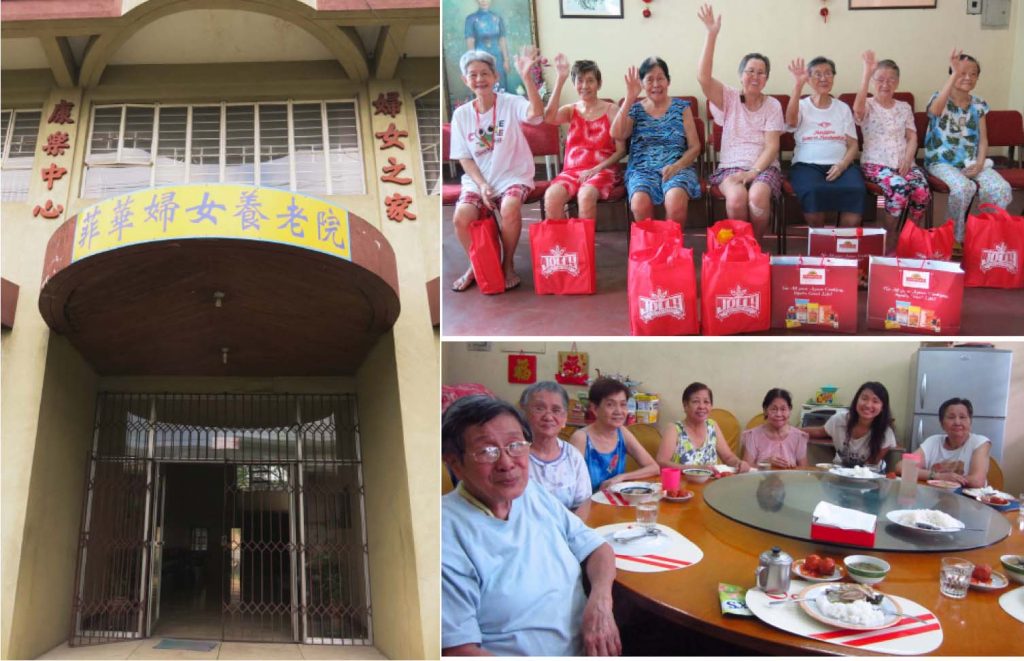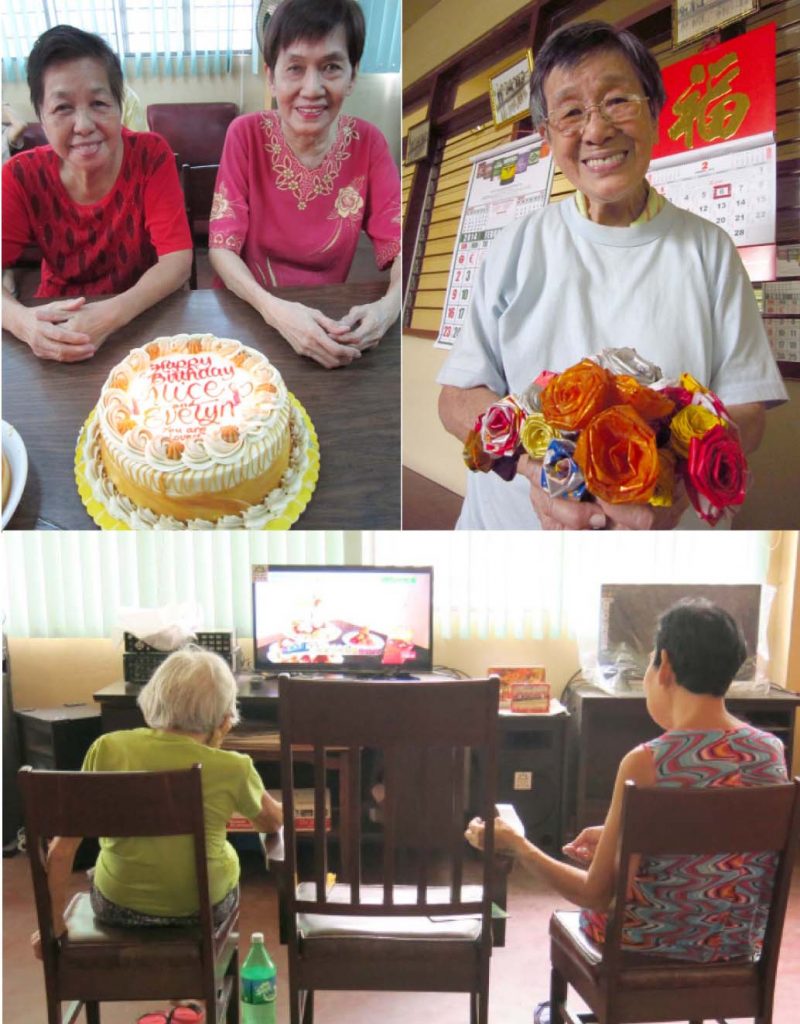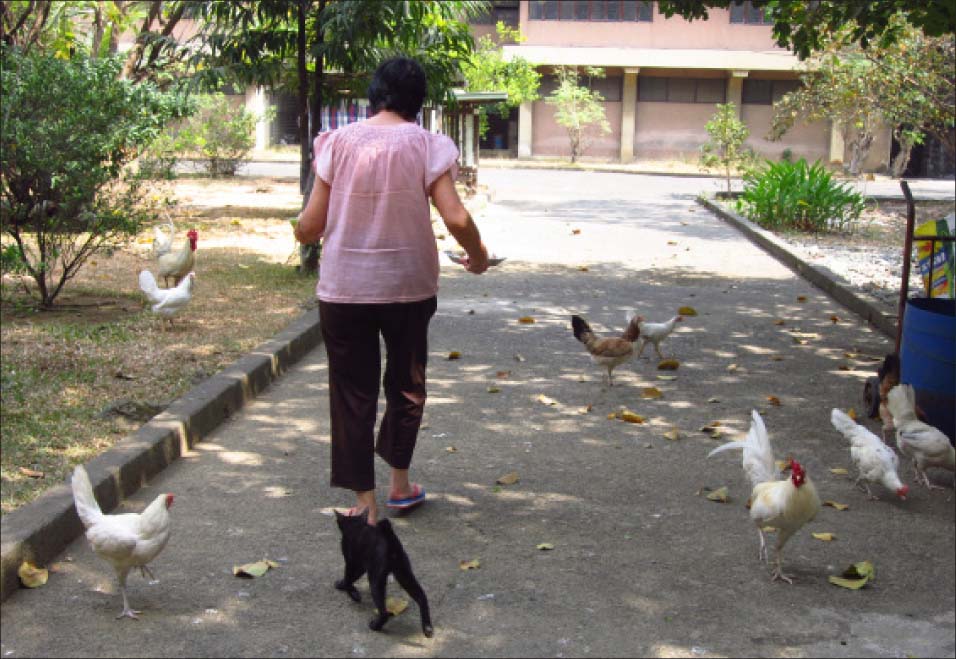There’s a wise saying, “Everyone should have three kinds of friends – those younger than you whom you can teach, those of your same age to hang out with, and those older from whom you can learn.” As teaching is my vocation, I am always around the younger crowd. Most of my peers are married, so the same-age friends I get to be with are a mere handful. But there remains a significant group which is very dear to me – the older group, and it’s like having multiple sets of grandparents. These are the ahmas at the Home for the Aged Filipino-Chinese Women in Malinta, Valenzuela City.
It was during the Chinese New Year of 2014 when I first knocked on the Home’s red door. Our family just moved to Valenzuela City, and the Home is situated nearby.
“Sino ka?” shouted an old lady from the other side.
“Uhm…I have tikoy to give to you,” I stuttered, half-startled at the belligerent tone and half-glad that I did not come empty-handed.
After about two minutes’ debate between the lady peeping at the door hole and another lady who happened to pass by about whether to open the door or not, they welcomed me in. I introduced myself as their new neighbor a few blocks down, told them how I always passed by their compound and wanted to get to know them. Thankfully, they were all very welcoming and the initial brash treatment was just a protective protocol to keep away unsolicited passersby.

It’s been over two years since my first visit and the ahmas at the Home are like my extended family now. I gained 10 more grandmothers! They’ve met some of my family members and we’ve spent special occasions together. I spend my birthdays with them and help celebrate their birthdays, too. On ordinary days, I come around 11 a.m. and join them for lunch, sometimes at 3 p.m. for merienda, or just about any time of the day. I’d catch them either watching the television or idly sitting by their garden.
Almost always, I pass by even without saying a word, like an old-time family member who knows she’s welcome to come each time. The ahmas all have a story to tell. They each come from different families, some are widows, some are single, some are childless. They stay in a 5,000-square-meter compound, which is home for all of them. The Home was put up in 1972 by Teh Siu Yong Limpe (戴秀容), an advocate of women’s rights, when she was president of the Filipino-Chinese Women’s Association, the same organization which runs the home and is now managed by her daughter Betty Limpe Ngo.
With the ahmas, we shared precious stories in the most mundane moments. Their openness and unfettered enthusiasm draw me to them and allow me to witness their life stories unfold again. I’m grateful that they have welcomed me into their world.
Ahma Suiting, the oldest at the Home, is a storyteller at heart who would tell me in lucid detail and arresting passion how her life has been spared three times in all her 89 years: “A wartime bomb exploded when I was on my way home… I was 15 at the time. Then when I married, I had a miscarriage and an illness, I never knew I’d live through all those; but now, I’m still alive! It’s enough, I’ve lived a long life already,” she mused.

Ahma Clarita, or Mrs. Lim as she’s also called because she used to work as an administrator at the Home before retirement, is the sweetest one. She would often cut some stalks of blooming rosal or gumamela buds for me to take home.
Ahma Evelyn is a retired Chinese teacher who can sing some real high notes. A teacher through and through, she affectionately explains repeatedly how I should not forget to write on the logbook each time I arrive because it is a formality which I am not exempted from.
Ahma Mercedes is also a retired teacher and despite her frail health does not cease to amaze me with her sharp memory and math skills. I jokingly asked if she can tutor me, she replied she’s too old but would be glad to do so if I insist. Ahma Alice is the reliable one who puts sense in the goings-on in the Home, especially when conversations get stirred up, because even older folks have their tampo moments, too. Being the youngest and responsible one, Ahma Alice takes care of managing the funds for the Home’s daily food and living expenses.
Ahma Mellie is the chill soul who enjoys watching television and feeding the dogs, one of which she named Happy. She was also the one who hesitated to let me in on my first visit, but her refined disposition and light countenance has now endeared me so much to her. Ahma Emie is the bubbly host who can make any visitor feel at home. Ahma Marcela has a wide smile whose cheery and hospitable mien is almost always the first one that greets me. She takes care of the donation inventory and always has a bottle of water to offer me.
Ahma Mary and Ahma Lolita came into the Home just a few months back and I’m still enjoying our chats as we’re getting to know each other. Though she’s not at the Home anymore, I remember Ahma Lehong who recently passed away at 99. The first time I met her, she was already in her bed most of the time and our conversation was in short sentences.
What I could not forget was her strong hand grip when we’d hold hands and she’d try to pull herself up. She’d sit up, smile, frown, look at me earnestly, and hold my hand for as long as I’m there. I learned from the other ahmas that she used to be in good spirits until her only son passed away a few years back.
Spending time with the ahmas makes me feel older, but in a good way. Hearing them recount war stories and disasters conjures an era of a Manila long gone past. When they tell me anecdotes of their lives as housewives, accountant, chemist, office workers, store owners, teachers, I sometimes feel like I need another lifetime to time-travel. When they share their love stories, I realize that they were once young, too, and had lived colorful lives.
The fine wrinkles on their necklines and the bald spots on their brows betray the beauty that I see in each of them. The gems of wisdom they share keep me grounded as I have lived just a third of the life they have already lived. They are selfless, in a way, as they impart to me a blessing of wise companionship which I would not have gained from others. Being with the ahmas is one of the most treasured times I have and I look forward to hanging out with them more. — First published in Tulay Fortnightly, Chinese-Filipino Digest 28, no. 21 (April 5-18, 2016): 8-9.
